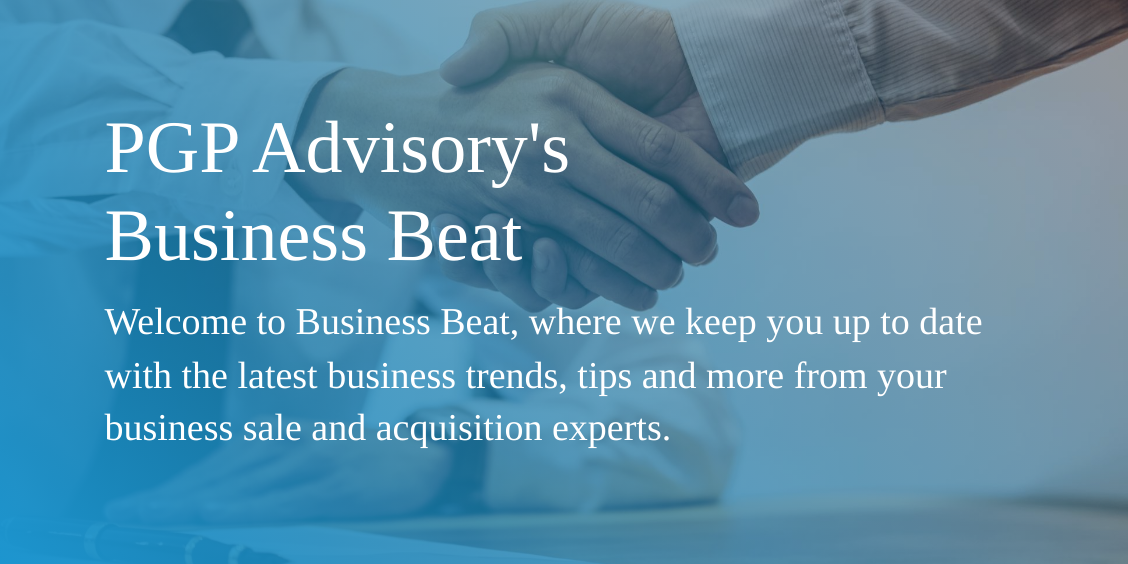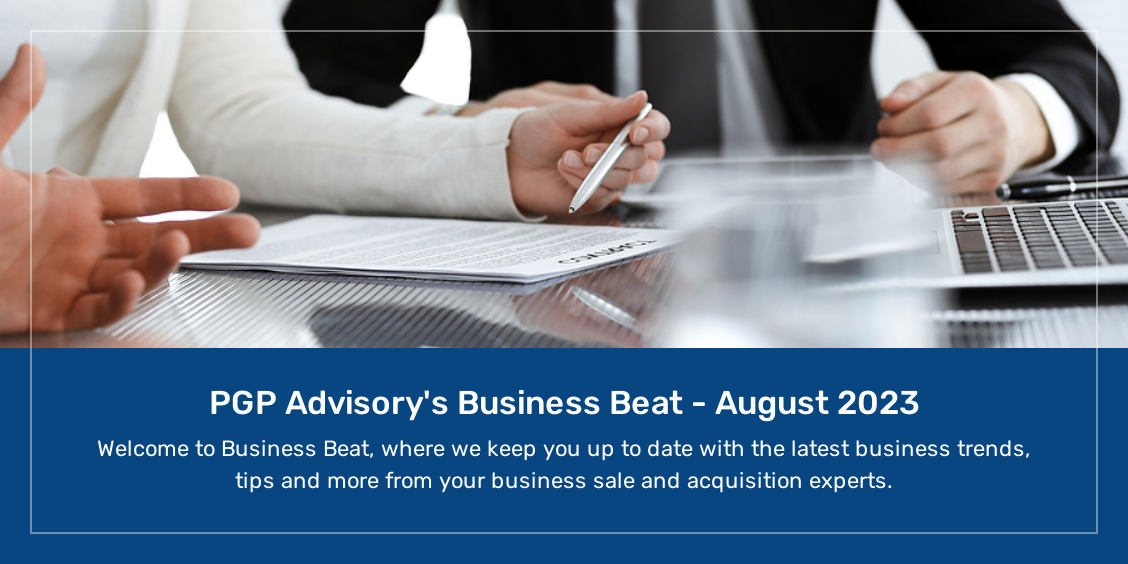

PGP Advisory’s Business Beat – December 2023

Entrepreneur’s Corner: Why You Should Address Your Company’s Weaknesses Head On
It is easy to get consumed with the urgent issues in our business. Carve out time each day, week, month, to “work on the business”. This investment of time will ultimately position your business to deliver the long-term results that are most important to you.
“SWOT”- Strengths, Weaknesses, Opportunities, and Threats- analysis is an important tool to help set direction for your business. Identify and fix the root causes of these issues will result in a stronger business that will pay dividends for you (time/profit), your customers(improved service), and employees (greater satisfaction).
SiriusXM’s The Reecie Colbert Show Interview with Entrepreneur Jason Brown


Jason Brown, Managing Partner of PGP Advisory, stopped by The Reecie Colbert Show to share his expertise with aspiring and current entrepreneurs.
Learn how PGP Advisory helps business owners:
- – Understand and achieve their goals.
- – Prepare for the inevitable reality- Everyone will eventually exit their business. The only question is on whose terms.
Life and business is about ideas. Successful entrepreneurs seek out new ideas and constantly learn, adapt, and grow.
Click Here to Listen to the Podcast!
The Importance of Developing Sales Forecasts




PGP Advisory attended the North San Antonio Chamber Coffee and Conversations at Magnolia Pancake Haus featured LindaRatner, an accomplished business owner, master coach, and sought-after speaker.
Linda shared the importance of developing a sales forecast in your business. Linda’s work prepares business owners to achieve their desired exit valuations.
Key takeaways:
- In business, Cash is King/Queen.
- To get a true picture of the business’s cash flow, entrepreneurs need to understand all three financial statements. Can you name them?
- Use data to determine what changes will have the biggest impact on your business. The outcome may surprise you.
Learn More About the North Chamber of San Antonio
Active Business Listings
Are you searching for a business to buy? Join PGP Advisory’s exclusive network to receive regular alerts on businesses available for sale. You’ll be the first to know about new opportunities. Receive our Active Business Alerts by subscribing via the link below! Check out a snapshot of our current inventory:
Profitable Home Care Services Franchise with Motivated Seller Deal


Price: $175,000
Cash Flow: $147,372
Location: League City, TX
Profitable Boutique Fitness Gym with Integrated Smart Gym Tech. Deal


Price: $350,000
Cash Flow: $80,000
Location: San Antonio, TX
Unique Mexican Ice Cream Retailer with Big Growth Potential


Price: $100,000
Cash Flow: $75,000
Location: San Antonio, TX
Ride Share Tech Platform Acquisition Opportunity


Price: N/A
Total Sales: $1,344,000
Location: Southeast U.S.
Vertically Integrated U.S. Paper Mill with a Focus Sustainability


Price: N/A
Total Sales: $2,500,000
Location: Central U.S.
Subscribe to PGP Advisory’s Active Business Alerts
PGP Advisory Announces Sale of Revered Adult Day Care Center


PGP Advisory is proud to announce the sale of an established Adult Day Care Center in McAllen, TX to a private buyer with ties to the local community. This transaction marks not only a successful business transfer but also an opportunity to build upon the exceptional care and support for adult populations and their families in the McAllen community.
This adult care center has served the community with compassionate care for many years, providing a nurturing and engaging environment for adults requiring day care. The acquiring team brings complimentary experience in education, business, and a strong their local presence with a shared commitment to the center’s values and mission. The buyers intend to build upon the facility’s rich legacy, expand its reach, and continue to positively impact lives.
Deal highlights:
- – Management team in place
- – Strong post-COVID rebound in clientele
- – The acquiring team brings complimentary experience in education, business, and a strong their local presence
Be the first to read the latest edition of PGP Advisory’s Business Beat by subscribing to our publications. Click here to opt-in!




PGP Advisory’s Business Beat – August 2023
Entrepreneur’s Corner: The Benefits of an Advisory Council
Experts recommend considering adding an advisory council to your business. This informal board would provide strategic advice on business management related issues. An advisory council would be in place to provide advice to your business, but unlike a board of directors, they will not actually make the key decisions. Further, while a board of directors often has equity in the business, an advisory council does not. Of course, an advisory council is not right for every business. You will typically see them in businesses that are making $3M-$25M.
The advisory council can identify and help address blind spots that will strengthen your business. They are an excellent resource as you scale and spend more time working on the business than in it.
Learn More About the Benefits of Advisory Council
Passive Investor’s Playbook


Recently, PGP Advisory had great conversation with Charlie Hardage on the Passive Investor’s Playbook. We explored the power of business + commercial real estate investments to build diversification into investors’ portfolios.
Click Here to Listen to the Podcast!
Going Global


PGP Advisory was honored to participate in a roundtable with Madam Under Secretary Lago of the U.S. Department of Commerce and distinguished San Antonio business leaders to discuss how the department and U.S. Commercial Service offices around the world can partner with the local business community to help unrepresented businesses grow through access to global markets.
The takeaway- the US Commercial Services is one of those best kept secrets that needs to be revealed. They want to help. They can open doors overseas that smaller businesses can’t on their own. Stay tuned…we ultimately want everyone to have access to “the room where it happens.”
Learn More About the U.S. Department of Commerce for International Trade
Active Business Listings
Are you searching for a business to buy? Join PGP Advisory’s exclusive network to receive regular alerts on businesses available for sale. You’ll be the first to know about new opportunities. Receive our Active Business Alerts by subscribing via the link below! Check out a snapshot of our current inventory:
High Growth Mexican Restaurant with Multiple Locations
Price: $740,000
Cash Flow: $425,000
Location: San Antonio, TX
Profitable Boutique Fitness Gym with Integrated Smart Gym Tech. Deal


Price: $500,000
Cash Flow: $80,000
Location: San Antonio, TX
Subscribe to PGP Advisory’s Active Business Alerts
Successfully Sold: Barkingham Palace


PGP Advisory served as the exclusive sell-side broker on the sale of Barkingham Palace, a 68-Kennel Pet Boarding and Training business to a Private Buyer.
Deal Highlights:
- Successfully negotiated a win-win deal structure and terms with a strategic buyer
- Sale included both business assets and associated real estate
- Excellent group of deal professionals facilitate a smooth transaction
- Industry, region, and business are positioned for future growth
“As owners seeking an informed exit strategy for our business of 18 years, it was important to us to find an experienced business advisor to navigate the complex, multi-faceted business sale process. Jason Brown had the most methodical approach for the sale of our business and the associated real estate. Jason demonstrated consistent strength in his attention to detail, consistent communications, problem solving negotiations and closing a deal with an amazing buyer that met our exit goals. We highly recommend PGP Advisory to all business professionals seeking the best in all the business services they offer.” (PGP Advisory’s Client)
Advisor Spotlight: Meet Ken
Senior Business Broker


Ken Powers brings more than twenty years of experience helping small and large companies create value through enabling sales growth and driving operational efficiencies. His corporate experience spans a wide range of industries including Healthcare, Technology, Aerospace and Defense, and Automotive. Ken brings expertise in strategy development and implementation, business transformation, and process improvement. Based out of Chicago, he is a seasoned executive who is ready to guide you and your business to the next level.
Ken earned his M.B.A from the University of Michigan, Ross School of Business with concentrations in Strategy and Finance. He earned his B.S. in Mechanical Engineering from Northwestern University.


Be the first to read the latest edition of PGP Advisory’s Business Beat by subscribing to our publications. Click here to opt-in!
Read More

Guide To Selling Your Business & Building Your Transition Team


“I’m not ready to sell now. I’ve got several years left.” A key follow-up question to ask yourself is: “Is now the right time to sell?” As the Fed continues to raise rates to combat inflation and the risk of recession looms on the horizon, how will your business fair in this environment? We encourage you to consider these external factors when weighing whether or not this is the right time to sell.
Hopefully you’ve read PGP Advisory’s article, “What to Expect When You’re Ready To Sell,” which highlights the preparation timeline and how to set realistic goals for the process.
The team at PGP Advisory has formed a step-by-step guide to ensure businesses are sold at the right time, for the right price, and to the right buyer.
Step 1: Be Informed
Do your research and educate yourself on the selling process. Consult with an M&A advisor.
An M&A advisor will help you establish a strategy tailored to your business and manage the complexities of the sale process so that you can stay focused on running your business. They’ll identify and qualify buyers, secure an offer(s), and negotiate the eventual sale with the best possible terms.
If you’re invested in selling your business for the best possible value, choose a leading M&A advisory firm to broker the deal.
Step 2: Get Your Finances in Order
Purchase price is important, but so are the terms on the deal. Accurate financials can make the difference between getting 80-90% of the purchase price at close (via bank financing) and you becoming the bank (in the form of seller financing) for a significant portion of the purchase price over several years.
Do your due diligence by organizing your bookkeeping and financials and getting ahead of items that could prevent bank financing or slow down the sale (such as sign-off from other shareholders or active lawsuits or legal proceedings).
Consider your business’ employee contracts, intellectual property issues, and federal and state tax requirements. To ensure you have time to fix all potential red flags, hire a third-party accounting firm to assess your financial statements and advise on an exit-friendly tax strategy a year or two before the sale.
Step 3: Get a Business Valuation
Turn to experts (e.g., business brokers, M&A advisors) to understand how much your company is worth and to whom. Value is more than a number on a paper. The value that matters is what a buyer is willing to pay for your business. A trusted advisor will help establish a range that you would expect a reasonable buyer to offer for the business.
Step 4: Build Your Transition Team
“Great things in business are never done by one person, they’re done by a team of people.” – Steve Jobs. Putting together a team early can prevent a lot of stumbling down the road. Here is our list of professionals that business owners should have on their team (before your business goes to market) to smoothly and successfully sell their business:
1) M&A Advisor – Expert on sale strategy and process
2) CPA – Expert on your financials and tax strategies
3) Lawyer – Expert on identifying and managing legal risks with both the business and sale
4) Financial Advisor – Expert on planning for post-sale impact on your overall financial objectives
Summary
As experienced M&A Advisors, we are at the center of your business sale transition team. If the issues are not unaddressed, you will spend valuable time and resources prior to and after the sale trying to “fix” things. Your business is likely your most valuable asset, and building a successful company can take years of time and effort. If you’re considering selling your business at some point, schedule some time to discuss how we can help you make an informed decision – and maximize the price you receive for the sale.


Thinking Of Selling Your Business? Start Here.
What to Expect When You’re Ready To Sell


There are several reasons small business owners decide to sell their companies — they want to move to another city or state, sales are down, they’re looking for a new challenge or it’s time to retire.
The prospect of selling your business can feel overwhelming, and you want to receive a fair price for the assets you’ve worked so hard to create. To make the process as easy and profitable as possible, you’ll want to start planning early. Whatever the reason, once you decide to sell, you can’t just hang up a “for sale” sign and wait for the offers to come rolling in. Selling for the right price takes time and preparation.
What’s Your Goal in Selling?
Owners often focus primarily on the question “How much can I get for my business?” However, the first question an owner needs to be prepared to answer is, “What results do I want to get from this transaction?” Business owners will typically focus on what they think their business is worth or how much a peer recently sold their business for, even if that business was in a different industry.
PGP Advisory suggests focusing on the owner’s personal needs and goals. For example, consider these questions:
- Do you want to transition the company to the next generation of your family or to employees?
- Is your goal to find a willing buyer in the open market and maximize the sale price?
- Do you plan to retire and live off of the proceeds from the sale for the rest of your life?
- Are you looking to invest some of your equity with the buyer and work with/for the next owner?
- Are you looking to reinvest in a different opportunity?
- What other goals do you have (e.g., paying for college educations, contributing planned amounts to charity)?
Understanding the Realistic Timeline is Essential
In an ideal situation, the questions above would be asked and answered several years before the owner wants to take their business to market. This timeframe would allow for appropriate estate and investment planning. Plus, having a longer timeframe allows owners and their advisors to consider what actions can be taken to increase the value of the company before going to market and leaves ample time for implementation.
Having time on your side can really pay off when selling a business. Whether you’re ready to retire or simply want to move on to a new venture, it’s imperative to keep in mind, that the completion of a sale can take well over a year, so keep that in mind as you plan your exit strategy.
At PGP Advisory, we explain to our clients that it’s reasonable to prepare for this to be a 2-year process, roughly from the time you decide to sell, all the way to the completion of the sale. Wrapping your head around this realistic time frame is a necessary first step. This critical preparation will help you to improve your financial records, business structure, and customer base to make the business more profitable. These improvements will also ease the transition for the buyer and keep the business running smoothly.
Selling a business requires an enormous amount of planning. As you begin the process, it’s important to focus on the step you’re in and the long-term objective. Otherwise, you may end up making short-term decisions that go against your ultimate plan.
Takeaways
Knowing what you want/need as a result of the sale and understanding the realistic selling timeframe, will set you up as much as possible for a smooth and successful transaction.
In our next segment, PGP Advisory will walk you through the first steps owners will want to take to begin the selling process from an advisor perspective, including helping you construct your transition team.
Read More

What’s In a Number? Must-Have Metrics For Your Business
April Kicks Off Financial Literacy Month
Financial Literacy Month is a nationally recognized campaign to bring awareness to the need for more financial education in schools and for adults. During Financial Literacy Month, financial institutions, nonprofits, and human service agencies increase their focus on the importance of financial literacy through events, programs, and counseling.
We see a goal that goes beyond helping just consumers learn more about finances to helping entrepreneurs actually improve the financial management of their most valuable asset- their business. The result is improved business and personal financial stability and success.
Why Financial Literacy Matters
- Parents rank teaching financial responsibility to their children near the top of their wish list.
- Only a handful of states require high school students to take a personal finance course before graduation.
- Poor financial literacy leads to poor decision-making which leads to poor behavior which limits the household’s ability to reach its financial goals.
- Increased financial literacy will help drive wealth for small businesses and their owners.
The Importance of Business Metrics
Last month, PGP Advisory discussed the importance of incorporating our top 7 value drivers into your business strategy to increase cash flow, as well as reduce risk, thus enhancing the overall value of your company. We established that the valuation process involves an assessment of your company and should be a crucial part of any business owner’s standard operating procedure.
The essential next steps to running a successful business, require a thorough analysis of the work, sales, and financial results. This cannot be done without tracking relevant business metrics. Measuring your organization’s performance requires thorough data collection and analysis. But with countless examples of business metrics, how do you know which ones are worth tracking? The ideal combination of key performance indicators (KPIs) will depend largely on your individual business’ needs.


What Gets Measured – Gets Managed
Business Metrics Every Company Should Know
For all businesses, it is critical to track operational metrics such as output, quality, and productivity on a regular basis. The specific measures will vary from company to company, but your productivity metrics improve operations by highlighting opportunities to standardize work, eliminate waste, and solve systemic problems. The result is happier customers, reduced costs, and a consistent operation that is easier for you (and any future owner of the business) to run.
Gross Margin is one of the most important metrics that an entrepreneur should know. It is crucial to running your business on a day-to-day basis. Gross margin lets you know how much of each sales dollar is available to pay overhead and profit after direct expenses are paid. Many businesses are seeing input costs such as wages, materials, and freight rise. Businesses with strong market positions are often able to adjust pricing to maintain their gross margins.
ROI measures the efficiency of an investment. It can be used to compare different investments made into your business. It is a great way to indicate what is working and what isn’t. For companies looking to grow through acquisition, ROI is a simple metric to compare the relative attractiveness of a potential target.
The current ratio is used to test a company’s liquidity and working capital. The current ratio is the company’s current assets divided by its liabilities. Calculating the current ratio, you will see if your company is readily available to pay its short-term liabilities like taxes, debts, and expenses. A business should keep its current ratio over 1 which means that there is enough working capital for healthy operation. For growing companies, it is an important indicator of whether or not you have sufficient working capital to fuel continued growth.
These two metrics answer the following: How much do you make per customer or lead during its lifetime? How much does it cost to acquire a customer? Knowing your LTV and CAC of your customer is a piece of the crucial information you can obtain. Every dollar of revenue is not equal. Recurring revenue from loyal, “sticky” customers are a valuable asset for your company. CAC and LTV are measures that inform which customers to target, the most effective and efficient sales and marketing approach, and how to ultimately grow more profitably.
The importance of web-analytics can’t be argued in the digital era. Every online business should have a basic understanding of web analytics.
What’s In a Number?
Why should your business be so concerned with metrics? For starters, these metrics are golden tidbits of information and can mean the difference between success and failure. There are many more metrics that exist for your company to track, such as project management metrics. The ones that matter most depend on your specific type of business. For example, if you sell products, tracking your inventory size may be important.
PGP Advisory recommends your company remain judicious in your choice of metrics to track. Business owners can easily become overwhelmed with data or spend too much time just collecting and analyzing rather than using the insights to actively manage your business.
With the appropriate metrics for your company in hand, you can steer your organization in the right director toward achieving your business goals.

